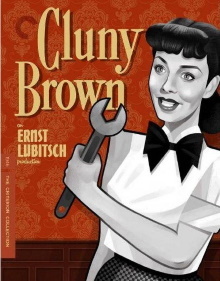I had this pegged as an American film on my list, was surprised to see the opening set in London and that’s it’s full of British characters and then later read that it is American after all. That actually makes sense given how much it exaggerates English mannerisms and makes fun of how one is supposed to behave according to one’s class from a perspective of an outsider to their society. Unfortunately while this film has its amusing moments, its many flaws causes it to fall short of true greatness and it isn’t that memorable.
A London man waits anxiously for the plumber as his sink is clogged and his guests for a cocktail party are arriving soon. When Adam Bellinski shows up, he is at first mistaken for the plumber but he is actually a Czech academic seeking refuge from the Nazis. Then Cluny Brown arrives saying she is the niece of the plumber and wants to help. Despite the men’s misgivings about a woman plumber, she proves to be competent. Bellinski is charmed and encourages her to never be afraid to do what she likes. However Cluny’s uncle is unamused and sends her off to a manor in the countryside to work as a maid. Coincidentally Bellinski also ends up there as a guest when he is recognized by the idealistic son of the family as a hero against the Nazis. As Cluny struggles to fit in and find her place, Bellinski tries to cheer her up but becomes a little jealous when she begins a relationship with the local chemist.
This film is rife with all kinds of structural problems. Bellinski and Cluny are obviously the couple of this romantic comedy yet they do little romancing and mostly seem like a comedic duo riffing off of each other. The owner of the house at the beginning is used to introduce both characters and then is never seen again. The son Andrew Carmel’s wooing of Betty Cream is a distraction that adds little to the film. Most everyone is interested in Bellinski’s backstory as a European refugee yet he dismisses it as being insignificant. In contrast, it is Cluny who seems incurious about Bellinski’s past. There are plenty of great scenes in this film such as Cluny serving dinner to the Carmel family and restraining herself at the birthday party for her prospective mother-in-day. But the structural glue that holds the film together is weak. Instead of truly intending to explore a young woman who is obsessed about pursuing a vocation traditionally undertaken by men, the film merely uses it as a starting point for gags. As my wife notes, this is not at all a feminist film even if it initially seems to be but that’s kind of understandable for a work that dates from the 1940s.
Set against that is the genuine charm of the titular character played by Jennifer Jones and the sendup of British society that at least partially rings true. As my wife, the boisterous and eccentric character feels like a version of Audrey Hepburn in Breakfast at Tiffany’s though of course it far predates that classic. This I think qualifies Cluny as being a very early prototype of the popular manic pixie dream girl stock character. Bellinski is pretty great at pushing the limits of the British penchant for civility and politeness to the breaking point, and it does eventually break when Betty Cream screams. Little observations like how servants are not meant to be neither seen nor heard or the silliness of the need to jear jackets for dinner aren’t original to us but are still fun to watch. I also detect in the flirting between the butler Syrette and the housekeeper Mrs. Maile a precursor to the relationship between the equivalent characters in Downton Abbey.
If the writing had just been a little better or Jones had become more popular, it’s easy to imagine this being elevated into one of the great classics. As it is this isn’t a bad film to watch but I think it’s mostly interesting as an early attempt at story tropes and character archetypes that would only be perfected much later.
